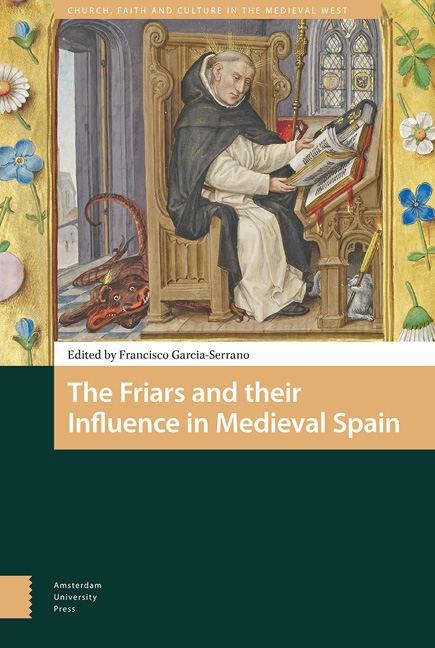Book contents
- Frontmatter
- Contents
- Abbreviations
- List of Illustrations
- Acknowledgements
- Introduction
- 1 Dominicus Hispanus
- 2 Ramon de Penyafort and His Influence
- 3 The Mendicant Orders and the Castilian Monarchy in the Reign of Ferdinand III
- 4 Ramon Marti, the Trinity, and the Limits of Dominican Mission
- 5 Narrative and Counter-Narrative: Dominican and Muslim Preaching in Medieval Iberia
- 6 The Poor Clares of Alcocer and the Castilian Crown (Thirteenth to Fifteenth Centuries)
- 7 Friars and Nuns: Dominican Economy and Religious Identity in Medieval Castile
- 8 Networks of Dissent and the Franciscans of the Crown of Aragon
- 9 Faction, Politics, and Dominican Inquisitors in the Fourteenth-Century Crown of Aragon
- 10 Sutzura e Viltat Carnal: The Place of Sin and Lust in the Treatises of the Franciscan Francesc Eiximenis (c.1400)
- 11 Valencian Dominicans Beyond the Convent of Santo Domingo
- 12 Ferdinand of Antequera and Santo Domingo el Real de Toledo: Patronage, Advice, and Spiritual Favour (c.1390–1416)
- Index
4 - Ramon Marti, the Trinity, and the Limits of Dominican Mission
Published online by Cambridge University Press: 16 February 2021
- Frontmatter
- Contents
- Abbreviations
- List of Illustrations
- Acknowledgements
- Introduction
- 1 Dominicus Hispanus
- 2 Ramon de Penyafort and His Influence
- 3 The Mendicant Orders and the Castilian Monarchy in the Reign of Ferdinand III
- 4 Ramon Marti, the Trinity, and the Limits of Dominican Mission
- 5 Narrative and Counter-Narrative: Dominican and Muslim Preaching in Medieval Iberia
- 6 The Poor Clares of Alcocer and the Castilian Crown (Thirteenth to Fifteenth Centuries)
- 7 Friars and Nuns: Dominican Economy and Religious Identity in Medieval Castile
- 8 Networks of Dissent and the Franciscans of the Crown of Aragon
- 9 Faction, Politics, and Dominican Inquisitors in the Fourteenth-Century Crown of Aragon
- 10 Sutzura e Viltat Carnal: The Place of Sin and Lust in the Treatises of the Franciscan Francesc Eiximenis (c.1400)
- 11 Valencian Dominicans Beyond the Convent of Santo Domingo
- 12 Ferdinand of Antequera and Santo Domingo el Real de Toledo: Patronage, Advice, and Spiritual Favour (c.1390–1416)
- Index
Summary
Abstract
Ramon Marti was certainly the most learned scholar of Arabic books in Latin Europe before the Jesuit Ludovico Maracci in the late seventeenth century, and his polemical works against Islam reflect this. However, after completing De Secta Mahometi in the 1250s, he shifted his interest to post-biblical Hebrew and Aramic texts and wrote two lengthy works, Capistrum judeorum and Pugio fidei. This chapter argues that in his writings, Marti continuously demonstrated a great interest in explaining the Trinity, and in doing so he connected with the scholastic movement in Italy, France, Germany, and England, turning away from the multi-religious world of Iberia.
Keywords: Ramon Marti, Dominicans, Pugio fidei, Trinity, medieval theology
In the earliest memories of the Order of Preachers, Spain, the very homeland of their sainted founder, was a remarkably – and surprisingly – uninteresting place. If Dominic's intention for his followers was, as Jordan of Saxony, the order's earliest historian put it, to ‘send them all, though few in number, throughout the world’ as Christian preachers, then Spain – with its tens, even hundreds of thousands of Muslims living under Christian rule – should have been a prime destination. Yet, according to Jordan's telling, the early Dominicans were ever turning away from Spain and its non-Christian population. Bishop Diego de Osma, Dominic's esteemed mentor, travelled to the papal Curia, Jordan tells us, seeking to be relieved of his episcopal responsibilities – not in order to devote himself to preaching to the Jews and Muslims of his homeland, but to evangelize the Turkic Cumans who were then invading Hungary. Four early Dominican friars were sent, Jordan relates, to the ‘regions of Spain’ (partes Hispaniae), but two of them soon returned to Dominic in Rome since they ‘had not been able to achieve anything fruitful in Spain’ (neque enim […] fructificare in Hispania potuerunt). Dominic directly packed them off to Bologna. Dominic himself made his way back to Spain on one occasion to visit Dominican foundations in Madrid and Segovia, but was in Paris again by the end of Jordan's sentence. While Jordan describes an elaborate disputation between Albigensian heretics and Dominic's friars in Fanjeaux in which ‘many of the [Dominican] faithful wrote their treatises containing arguments and authoritative [scriptural] passages as confirmation of the [Christian] faith’, we read nothing of preaching to Jews or Muslims in Iberia, let alone writing tracts against them.
- Type
- Chapter
- Information
- The Friars and their Influence in Medieval Spain , pp. 85 - 106Publisher: Amsterdam University PressPrint publication year: 2018



